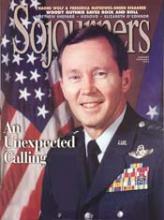By now you've probably heard the news. The greatest rock-and-roll record of 1998 featured 50-year-old songs by a guy who's 10 years deader than Elvis. You've even seen it in these pages ("Worthy of Note," September-October 1998).
But old news or not, I can't get Mermaid Avenue off my mind. That's the name of the epic collaboration between English lefty singer-songwriter Billy Bragg, American roots-rock band Wilco, and Woody Guthrie's old notebooks. Guthrie's daughter, Nora, gave Bragg and Wilco access to 1,000 songs Woody left behind without tunes. The idea was to put them in a contemporary musical context that would reflect Guthrie's spirit as an American popular artist and political populist.
Why pick a Brit like Bragg to interpret this most American of artists? Well, for one thing, as a European, Bragg understands the Left political culture in which Woody operated. That culture vanished from these shores during the '50s Red Scare. The only Americans who know it are octogenarians, historians, or both.
Why Wilco? Because unlike Harvard dropout Pete Seeger, Woody Guthrie was not a "folk singer." At least not until he got to New York and people started calling him one. Before that he was just a country singer who liked to talk. Even Guthrie's homegrown Christian socialism was not unusual in the east Oklahoma of his boyhood. The Wilco boys, southern Missourians themselves, are as much heirs to Guthrie's musical tradition as Bragg is to his political one. They simply incorporate the post-Elvis extensions of Guthrie's Southern hillbilly blues.
Also, hailing from post-Christian Britain, Billy Bragg would have problems with Guthrie's Christianity. Guthrie's New York buddies did, too. Many of them have recalled that Guthrie, who wrote a column for the Communist Party newspaper, was turned down for CP membership because of his religiosity. Wilco does the song "Christ for President" on Mermaid Avenue.
Read the Full Article
